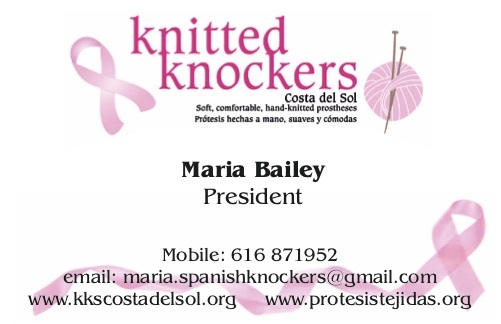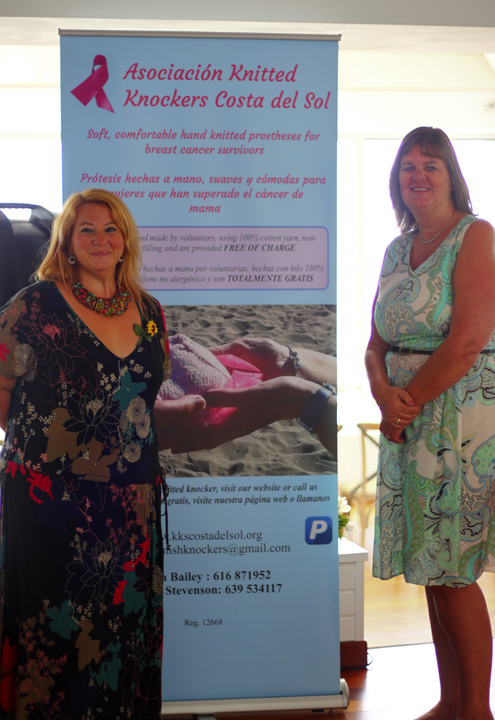Maria Bailey is 63 and lives in Benalmadena. She was diagnosed with breast cancer in 2015. At the time she was spending most of the year in the UK, staying in Spain for extended breaks several times a year. Maria attended routine breast screening in April, then headed off to Spain for five weeks. Upon her return to the UK, a letter was waiting for her, from the hospital, recalling her following the mammogram results. Here is her story:-
My husband came to the hospital with me and, following another mammogram, I was informed that there was something ‘suspicious’ showing on my earlier mammogram. Apparently it was very small, deep inside my right breast and I would not have been able to feel it myself. I was given a biopsy there and then. Before we left, a specialist nurse talked to my husband and I to make sure I was ok. At that point, I still expected the results to show it was benign.
The following week I returned to the hospital to be told the results – it was malignant. I felt surprised but, instead of denial, my head was full of questions: What did we do next? Would my two daughters be likely to develop breast cancer? When would treatment start? etc etc
The next couple of weeks were a whirlwind of hospital appointments, more tests, another biopsy etc etc. I was given a date for surgery – a lumpectomy and lymph node removal.
The actual surgery was straightforward. I was out of hospital the same day and left to recover at home.
Two weeks later I returned for the results. The cancer had all been removed and the lymph nodes were clear, meaning the cancer had not spread. Huge relief all round. I had got away very lightly compared to others.
A course of radiotherapy took place three months later, daily, for three weeks. I was also prescribed hormone therapy for five years.
How did you stay positive throughout the treatment?
After the initial shock of the diagnosis, I remember feeling strangely calm about everything. The rest of the world was shut out and my treatment became totally all consuming. I could not focus on anything else and simply focused on the job in hand, to get through my treatment.
How much support did you receive from outside organisations?
I was desperate for information about my diagnosis and treatment, so searched the internet for support organisations. As I was in the UK, I registered with ‘Maggie’s Online Centre’ which encouraged me to start a blog. This was priceless as specialist staff read blog entries and answered queries, or offered guidance if needed. There was an online community where people could ask questions openly and discuss any concerns. The support was amazing and very helpful.
I then made a visit to the Maggie’s Centre in Newcastle upon Tyne. Everyone was so welcoming and understanding. The centre had an aura of calm and was a haven to relax in between hospital appointments and radiotherapy sessions. There are several Maggie’s Centres across the UK and they are priceless.
What would be your advice to anyone else facing breast cancer?
Ask questions. Keep yourself informed at all times. Knowledge is power. I used to go to my appointments with a list of questions about my treatment etc.
Talk openly about your feelings and emotions. Don’t bottle things up, it is not healthy for you.
Stay positive. There is nothing you can do to change your situation, you have to accept it, but by taking control and keeping informed, you should feel more positive.
Also, listen to your body. Rest when you need to and for however long you need to. Hopefully your family and friends will be supportive and understand if you need to go to bed in the middle of the afternoon.
How has it changed you?
I always try to find a reason for whatever has happened. Perhaps that is my way of coping. I also try to turn a negative into a positive. As a former college lecturer, I felt that I was now carrying around a wealth of knowledge and experience and I was desperate to use it in a positive way. I contacted several breast cancer support organisations to ask whether I could volunteer in any way, but nothing seemed right.
In May 2016, six months after finishing my radiotherapy treatment, I was sitting on the terrace, in Spain, feeling really bored. I had picked up a copy of SUR in Engish that day, something I very rarely did, and was reluctant to read the back cover as, from experience, they usually contained sports reports. However, on the back page, I was amazed to see a photo of four ladies from the village of Mollina, near Antequera, all holding what was described as knitted knockers. Never having heard these words before, I did a quick internet search and was amazed at what I learned. A knitted knocker was a hand knitted breast prosthesis for ladies who have had mastectomies. Immediately I knew that this was something I needed to get involved in. I remember shouting to my husband “I’ve found my next project!”
Since that day I have worked tirelessly to promote knitted knockers and, in November 2016, Knitted Knockers Costa del Sol was formed. We became a registered charity in January 2017, with myself as president. The rest is history!
Breast cancer certainly changed my life – for the better. I now feel so much more fulfilled and am using my experience in a very positive way. I have met so many wonderful people through my work. Sadly, quite a few of the ladies I met have since died as cancer has a habit of coming back to get you when you least expect it. I learned to accept that, by working for a breast cancer charity, it is to be expected that some people will die from the disease. There is nothing I can do about that, but I know that, for a short time at least, our knitted knockers gave them back some self confidence and made them smile again. That, to me, is priceless.


